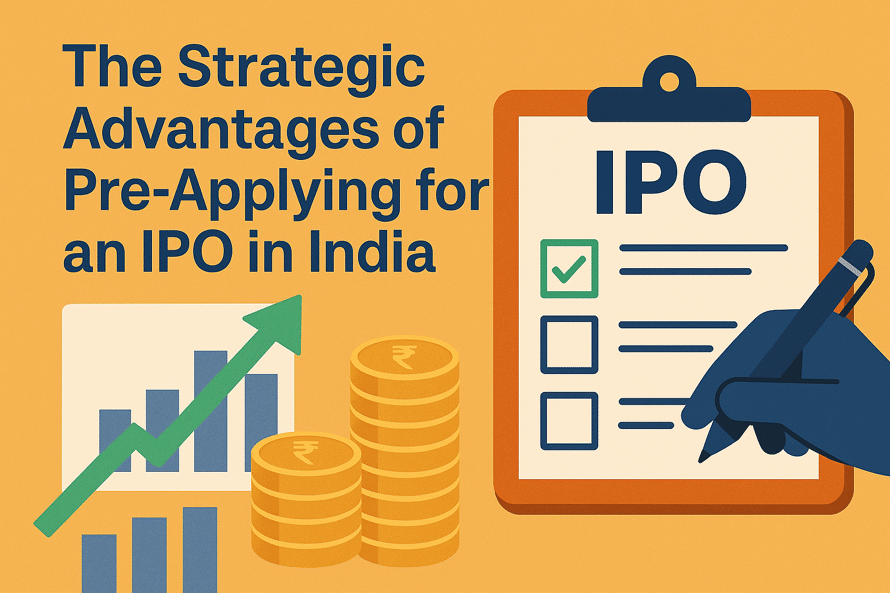The Strategic Advantages of Pre-Applying for an IPO in India

Initial Public Offerings (IPOs) often bring a buzz of excitement to the Indian stock market. But beyond the headlines and listing gains, there’s a quieter strategy helping investors streamline their IPO applications: pre-applying. This blog dives deep into what pre-applying really means, how it compares to pre-IPO investing, and what you, as a retail investor, should know.
What Does It Mean to “Pre-Apply” for an IPO?
Pre-applying for an IPO allows you to submit your IPO application before the official bidding window opens. Think of it like booking movie tickets before the weekend rush—you lock in your request ahead of the crowd.
Here’s how it works:
- You place your IPO application via your broker’s app or website.
- The broker queues up your bid and submits it to the exchange when the IPO opens.
- You receive a UPI mandate after bidding begins, which you need to approve to block the funds.
- If allotted, funds are debited; if not, they’re unblocked automatically.
This feature is now available across most major brokerage platforms in India and is particularly handy for busy investors who want to avoid last-minute hassles.
Why Pre-Applying is a Game-Changer for Retail Investors
1. Convenience Without the Clock Pressure
Peak hours often bring website crashes and UPI delays. Pre-applying lets you submit your bid at a calm time, even outside market hours.
2. Avoid Technical Rejections
Errors during a last-minute scramble are common. Pre-applying helps prevent rejections caused by missed deadlines, weak internet connections, or incorrect UPI details.
3. Lock in the Offer Price
Retail investors can choose the “cut-off price” while pre-applying, ensuring they are eligible at the final determined price, without worrying about price selection errors.
4. Early Access to Prospectus
Pre-applying gives you time to study the company’s Red Herring Prospectus (RHP), allowing a better-informed decision.
5. Psychological Relief
No FOMO, no rush. Just a smooth, structured process—ideal for both new and seasoned investors.
Pre-Apply vs Pre-IPO Investing: Don’t Get Confused
It’s common to mix up “pre-applying” with “pre-IPO investing,” but they’re totally different animals.
| Feature | Pre-Apply for IPO | Pre-IPO Investing |
|---|---|---|
| What is it? | Apply early for a public IPO | Invest in private, unlisted shares |
| Timing | Days before IPO opens | Often years before IPO |
| Access | Available to all retail investors | Typically for HNIs or via specialized platforms |
| Risk | Moderate | High (illiquidity, lack of regulation) |
| Returns | Potential listing gains (10-40%) | High upside (2x–100x), high risk |
| Liquidity | High—stocks trade on listing | Very low—may take years |
| Regulation | SEBI-regulated | Lightly regulated |
| Minimum Investment | ₹2 lakhs max for retail | Usually ₹25L to ₹1 crore |
Bottom line? Pre-applying is a process feature. Pre-IPO investing is a high-risk, early-stage investment opportunity. Understanding this distinction is critical to making the right decision for your financial goals.
Common Myths: Does Pre-Applying Boost Allotment Chances?
Short answer: No.
Your chance of getting IPO shares doesn’t improve just because you applied early. All retail allotments are processed via a random lottery system governed by SEBI rules.
Real Ways to Boost Your Allotment Odds
- Apply for one lot (the minimum): More investors get a chance this way.
- Use multiple Demat accounts with different PANs in the family.
- Always choose the cut-off price to avoid price mismatches.
- Avoid last-minute bids to sidestep UPI failures or server overload.
- Ensure accuracy: Incorrect PAN, UPI, or multiple applications from the same PAN are common rejection reasons.
How to Pre-Apply: UPI and ASBA Methods
UPI Method:
- Use your broker’s app/website.
- Select IPO, enter your UPI ID, quantity, and price.
- Accept the mandate on your UPI app to block funds.
Tip: The UPI ID must belong to the person applying. Using someone else’s ID = rejection.
ASBA Method:
- Login to your bank’s net banking portal (if it’s an SCSB).
- Or submit a physical ASBA form to your bank.
Is It Free to Pre-Apply?
Yes. IPO applications are free for retail investors.
No brokerage charges apply for applying. You may pay a fee only if you sell your shares after listing (depending on your broker’s delivery charges).
What’s New: SEBI Updates on SME IPOs & Grey Market Controls
- SEBI now mandates higher disclosure norms and minimum investments for SME IPOs (₹2 lakh minimum).
- It’s also working on a regulated pre-listing trading platform to replace the grey market, making the process more transparent.
These moves aim to enhance investor protection and make the IPO journey safer for everyone.
Final Thoughts & Smart Investor Checklist
Pre-applying is an underrated but powerful tool. It won’t boost your allotment chances, but it will:
✅ Reduce stress
✅ Avoid technical hiccups
✅ Improve decision-making quality
✅ Ensure timely and accurate submissions
Recommendations:
- Use the pre-apply option as early as possible.
- Analyze the prospectus, don’t just follow IPO hype.
- Apply smartly using one lot and verified UPI/Demat details.
- Stay updated with SEBI rules and market trends.
By treating IPO applications like a planned investment rather than a speculative race, you can improve your overall experience and long-term returns.
FAQs
What is pre-apply for an IPO?
It means submitting your IPO application before the bidding window officially opens, using your broker’s platform.
Does pre-applying increase allotment chances?
No. Allotment is done through a computerized lottery. Timing doesn’t affect your chances.
Can I pre-apply using UPI?
Yes, most brokers support UPI-based pre-applications. Just ensure your UPI ID matches your bank account and PAN details.
Is there a cost to pre-apply?
No. IPO applications are free for retail investors.
What’s the difference between pre-IPO and pre-apply?
Pre-apply is an early application process for public IPOs. Pre-IPO investing is investing in unlisted shares of private companies—more risky and less liquid.




